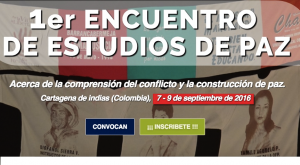FREE FLOW OF INFORMATION
Excerpt from the website of the Encounter (translated by CPNN)
The First International Encounter for Peace Studies – Cartagena de Indias (Colombia), 7 – 9 September 2016 – is a space for academic discussion of singular importance in the field of social sciences. It aims to strengthen links between theoretical discussions about peace building, as well as the necessary links for conflict transformation in that context. By listening to different voices and perspectives and by commitment to an interdisciplinary and transdisciplinary perspective, we can assimilate the approaches of various investigations, and create the conditions for engagement and dialogue with various stakeholders of social conflicts.

During the course of the meeting, there will be cultural activities: exhibitions of photography and short films and documentaries, cultural experiences, etc. These materials may be displayed and/or presented by their authors or guest commentators.
MODALITIES OF PARTICIPATION
Presentations and discussions with special invited guests
Roundtables: Group presentations on each of the thematic lines
Presentation of Experiences around specific themes in order to establish dialogue and cooperation among participants.
Workshops involving practicing teachers and graduate students
THEMATIC SESSIONS
The theoretical content and scope of the thematic lines are presented below and the coordinators of each will be forthcoming soon.
Justice, Truth and Forgiveness
In this session are presented the advances and research results concerning transitional justice processes both local and global, including trends, prospects and strategies undertaken by different actors (victims, perpetrators, state, civil society, media, academia, etc.) and institutions that are responsible for their consolidation. The various theoretical and methodological trends for the construction of public policies aimed at strengthening peace and reconciliation are analyzed., responding to contemporary debates as well as the political implications resulting from the knowledge and judgment of atrocities
(Article continued in right column)
What is happening in Colombia, Is peace possible?
(Article continued from left column)
Land, Territory and Post-Conflict
This theme will reflect on the challenges of policy for structural transformation of land ownership and use in Colombia. Studies are presented concerning land restitution, formalization of land ownership, the recovery of public lands, and new visions of rural development from a multidimensional perspective including the perspectives of those who have been involved in the Colombian conflict. It will be interesting to learn about the advances and research results concerning possible legal reforms intended to regulate the legalization and social use of land by the victims of the conflict.
Education, Pedagogy and Communication for Peace
The presentations of this session highlight progress and results of studies about initiatives and experiences around the introduction of the theme of peace into schools and universities, as well as works that address the challenges of communication in the context of the transition to peace. The axis of this area is the dissemination of research processes and knowledge generation that promote teaching and learning in the context of a culture of peace. Also considered are the devlopment of spaces for social tolerance and solidarity, as well as questions of legal reforms that require educational institutions to be involved in the construction of peace.
Urban Violence and Human Security
This session concerns research to identify and describe the different discourses involved in building security policies enunciated by the different actors concerning the question of punishment for past offenses. It will address the contexts and discourse concerning strategies to contain and transform urban violence as well as violence generated in post-conflict and/or post-agreement areas. It will also present papers from cultural, political and economic perspectives that analyze government policies to fight against organized crime.
Struggles and Social Movements
This session presents progress and results of academic work and the sharing of experiences about struggles and empowerment of collectives and social movements. It will elucidate control strategies and recognition of rights based on the constitutional guarantees for freedom of assembly. It is expected to provide a space for discussion in which different social actors (unions, LGTBI Community, Afro Movements, feminist movements, collectives for the rights of peasants and cultural movements in general) can explain the dynamics and challenges they face in the context of neoliberalism, including globalization and loss of local involvement in the economy and privatization of social and political guarantees, as well as the understanding of dynamics articulated in the post-conflict context.
For information about costs and registration, go to encounter website.
(Thanks to Alicia Cabezudo who sent this to CPNN)